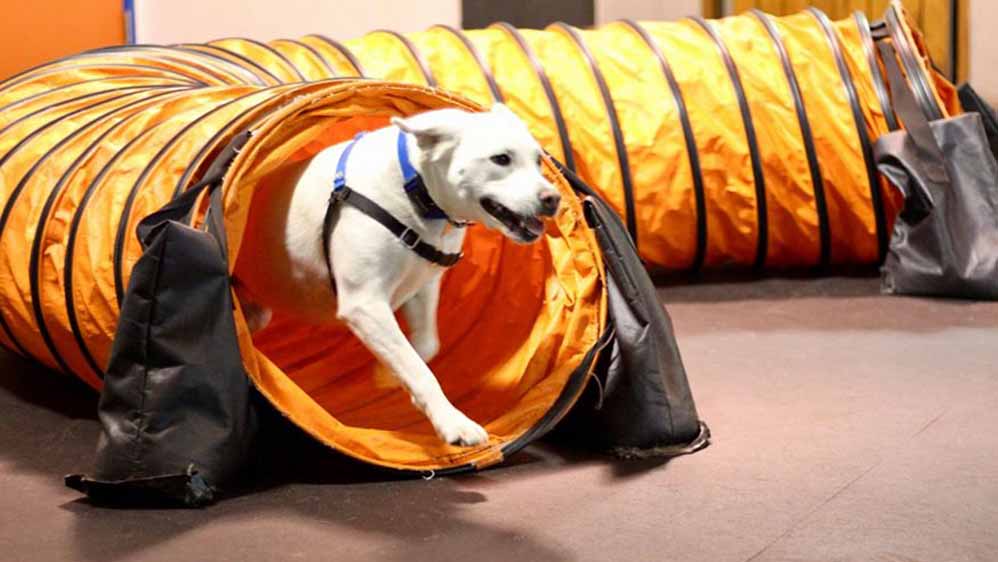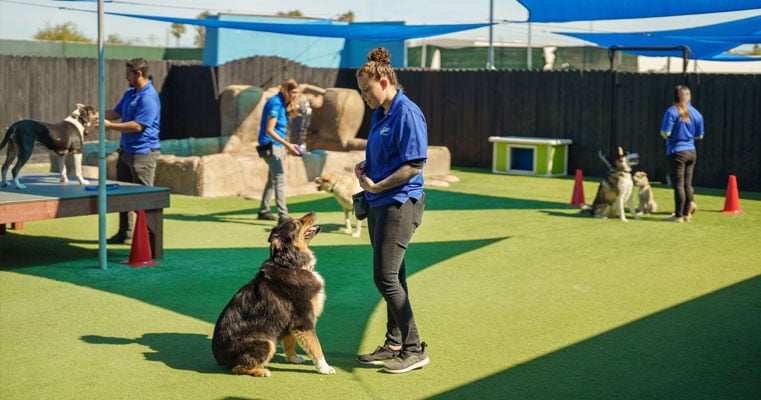Raise Your Abilities with Local Dog Training Charlotte Programs
Raise Your Abilities with Local Dog Training Charlotte Programs
Blog Article
Unlock Your Canine's Prospective: Proven Dog Training Approaches for Success
Reliable dog training is a nuanced process that hinges on recognizing canine actions and using clinically backed techniques. By including positive support, developing clear commands, and prioritizing socializing, pet owners can grow a productive partnership with their animals.
Understanding Canine Actions
Recognizing pet habits is essential for effective training and promoting a favorable connection between pet dogs and their owners. A detailed understanding of canine body language, articulations, and social interactions is essential for recognizing their requirements and emotions. Pet dogs connect largely with non-verbal cues; as an example, a wagging tail might suggest excitement, while pinned ears can signify concern or submission.

In addition, ecological aspects play a considerable function in forming a dog's actions. Changes in regular, brand-new surroundings, or the presence of unknown individuals can result in stress or anxiousness in dogs. Acknowledging these triggers enables proprietors to reduce adverse responses and develop suitable training techniques.
Ultimately, a deep understanding of pet actions lays the structure for effective training techniques, boosting both actions and the general bond in between the canine and its owner. Dog training. This knowledge is important for promoting a well-adjusted, delighted canine buddy
Favorable Reinforcement Techniques
Reliable training counts greatly on favorable reinforcement strategies, which have been shown to yield significant lead to forming preferred habits in pets. This technique includes compensating a canine for showing particular behaviors, therefore increasing the possibility that these behaviors will certainly be duplicated. Rewards can take different types, consisting of deals with, appreciation, toys, or playtime, depending on what motivates the specific pet.

It is necessary to gradually eliminate incentives as the pet dog discovers the habits, transitioning to recurring support. This method preserves the habits in time while stopping dependency on continuous benefits. By focusing on positive support, fitness instructors can grow a relying on connection with their canines, promoting a participating and healthy and balanced training setting that enhances general obedience and performance.
Establishing Consistent Commands
A basic element of successful dog training is the facility of constant commands. Consistency in commands is critical for efficient interaction in between the fitness instructor and the dog. When commands are uniform, canines find out to link certain words with desired actions, which speeds up the training process and enhances understanding.
To establish regular commands, it is crucial that all household participants make use of the same terminology and gestures. If one individual makes use of "rest" while another says "sit down," it can create complication for the pet dog. Select clear, distinctive words for commands and make certain everyone associated with the canine's training sticks to these choices.
Strengthen commands through regular technique, ensuring that the canine obtains sufficient opportunities to react appropriately. When a dog successfully complies with a command, prompt favorable support needs to follow.
Finally, be person. Developing regular commands takes some time and initiative. With dedication and clarity, you will certainly help your dog create a solid understanding of assumptions, inevitably resulting in a well-behaved buddy.
Socializing and Direct Exposure
Interacting socially a pet is crucial for fostering a positive and well-adjusted companion. This procedure involves subjecting your dog to a selection of atmospheres, individuals, and various other pets to create their social abilities and versatility. Early socializing, preferably between the ages of three to fourteen weeks, is crucial, as it lays the foundation for a dog's future actions.
Throughout socialization, aim to provide favorable experiences in various settings, such as parks, hectic roads, and homes with various other pets. Introduce your dog to numerous stimulations, including noises, views, and scents, making sure that each encounter is rewarding. This direct exposure assists mitigate fear and anxiousness, leading the means for an extra durable pet dog.
Involving in regulated group play sessions with various other canines can additionally improve social skills, instructing your pet dog ideal communications and boundaries. Prioritizing socializing will substantially contribute to your i loved this pet dog's total happiness and actions throughout their life.
Conquering Common Training Obstacles

An additional constant issue is disturbance. Dogs might struggle to focus in strange or busy setups. Gradually desensitize your dog to distractions by starting training in a quiet environment and gradually introducing even more stimulations as they become skillful (dog training charlotte nc). Positive support strategies, such as treats and praise, can maintain inspiration and emphasis.
Furthermore, virtual puppy training behavior concerns like leaping or too much barking can come to be discouraging. Address these by showing alternate habits, such as sitting smoothly when welcoming visitors. Consistency and perseverance are critical; enhance preferred habits regularly and prevent scolding, which can bring about complication.
Last but not least, acknowledge that each pet dog is special, and training timelines may vary. Tailor your strategy to your pet dog's individual demands, and look for professional support if needed. With perseverance and the best strategies, overcoming these obstacles can result in a trained, delighted canine companion.
Verdict
Finally, unlocking a dog's possible requires a comprehensive strategy that includes an understanding of canine habits, the application of positive support methods, and the facility of constant commands. Early socializing and exposure to varied atmospheres further improve a dog's versatility Discover More and self-confidence. By addressing usual training obstacles with tailored strategies and persistence, a unified and cooperative relationship between dog and handler can be cultivated, eventually resulting in a mannerly buddy efficient in thriving in various circumstances.
Efficient pet training is a nuanced procedure that hinges on recognizing canine actions and utilizing scientifically backed approaches.Understanding pet dog actions is important for effective training and cultivating a favorable relationship in between dogs and their owners.Reliable training depends heavily on favorable reinforcement methods, which have actually been shown to generate significant results in shaping preferred habits in dogs. When commands are uniform, pet dogs find out to connect details words with preferred habits, which accelerates the training procedure and improves understanding.
In verdict, unlocking a canine's potential necessitates a detailed approach that integrates an understanding of canine behavior, the application of favorable support methods, and the facility of regular commands.
Report this page